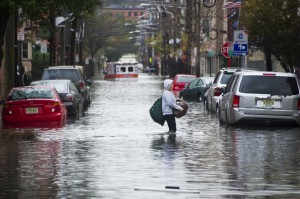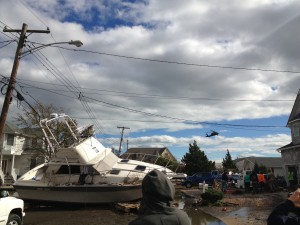By Natalie Kouba
News Editor
Carly Koziol and her sister didn’t pay much attention to the storm warnings. While their father ran frantically from store to store stocking up on food and flashlights in preparation for Hurricane Sandy, she and her sister were out shopping at the mall, and assumed the storm “wasn’t a big deal.”
But when the storm surge started at 9:30 p.m. on the first night, her family decided it was time to leave their home and go to her grandmother’s house. Her next door neighbors, she explained, tried to leave only a half an hour after her family, but it was impossible.
Koziol is a New Jersey resident like most students at the College who experienced the “Frankenstorm” last week. Though some towns did not even lose power, many students’ homes remain in the dark, while other students’ homes and possessions drowned in the hurricane.
Students were relocated from their homes, temporarily moving in with relatives or friends.
When Koziol’s family found shelter at their grandmother’s house, the conditions were not much better.
“It looked like an aquarium,” Koziol said. Water surrounded the house and began seeping under the doors, although the water line did not drop for a couple days. Her dad would squeegee the floor regularly to prevent the room from flooding.
After the storm, her family went back home. There was a boat in the middle of the street, three houses burned down, and cops manning the neighborhood.
All the food in their fridge had spoiled, but there was a hot dog cart in town that was open. “We lived off hot dogs. They were soggy and disgusting, but we needed food,” Koziol said.

Four of their five cars were flooded up to the steering wheel. Koziol had just finished paying off her Mercedes Benz and was excited to finally own a car of her own. The crawl space was flooded, and they had no heat or electricity.
The chiropractic office her parents owned and worked in flooded and most of the equipment was destroyed. A small fire broke out when her father tried turning on one of the computers. Her father shouted, “Take my degrees and run!” as the fire trucks were coming nearer and her family scrambled and tore the plaques from the wall.
“In the end you have your education, family and friends,” Koziol said. “It’s so easy to say, we lost this, we lost that, but other people lost more.”
For Koziol, the most challenging part of the whole experience has been coming back to the College and being away from her home community.
“Being at home, everyone was going through the same thing … I felt really guilty being here,” Koziol said.
The insensitivity of many of her friends was another hardship Koziol faced. While her family was returning to her battered home after Hurricane Sandy, friends were sending her pictures of their Halloween costumes, and neglected inquiring about how she was doing, explained Koziol.
“In a time of disaster and struggle, you see who is really there for you,” Koziol said. “It wasn’t just our hardships. It was the revelation of friendship.”
Another member of the College community who was not hit hard by Hurricane Sandy reached out to others to shelter during the storm.
Professor Diane Steinberg opened her home in Ewing to fellow faculty members Cynthia Paces and Felicia Steele and their families, who had lost power from the hurricane.
Steinberg not only invited her co-workers and their families to stay at her home, but other friends as well. At one point, she said, there were 14 people staying in her home, although most of them were “day trippers.”
At her home, visitors enjoyed a bounty of soups, phone and laptop chargers, hot showers, and even some time playing Xbox for their children.
“We never had more people than chairs, or more people than soup spoons, so it was all good,” Steinberg said.

Up in northern New Jersey, the conditions were much different than in Ewing.
Josie Perez, a sophomore mathematics and elementary education double major from Hoboken, has yet to return to her apartment since the storm. She planned to stay on campus for fall break, but when TCNJ Alerts began sending students messages basically saying, “take cover,” Perez decided, “I should probably go home.”
The trains were so delayed that she went to a friend’s house in Paramus instead. While watching the news, Perez realized the storm was headed straight for New York.
“That’s when I knew it was going to affect my hometown,” Perez said.
The cellular services in Hoboken were out, so her mom would go out of town each night where service was available to talk to Perez.
According to her mother, she could see water rising up the stairs. They were dry on the third floor of the apartment building where they live, but the second floor and lobby below had flooded. The garage also flooded, destroying Perez’s family car.
“Our town was basically the Hudson River,” Perez said.
Another student at the College experienced flooding in her town as well.
Sarah Gugliotta, senior psychology, lives in Freeport N.Y., just on the south side of Long Island. Her family knew the approaching storm was going to be strong, so luckily they prepared by moving the valuables and furniture they could to the second floor.
Even with their preparations, the water in their house ruined their washer, dryer, and the fridge and freezer kept in the garage, along with couches, a rug, and the shed that stood next to the house.
Due to the water damage, the dry wall and insulation needed to be removed to prevent mold.
In this tough time, her community pulled together, as did many across the state. Neighbors who got their power back before Gugliotta’s family let them shower and do laundry in their homes.
“Luckily no one in my family or anyone else’s I know lost their lives, and we lost less than a lot of people in my area,” Gugliotta said.
Tim Skinner, a junior electrical engineering major from Monmouth Beach, was relatively lucky, and his home was spared from the storm.
The rest of his town, however, is still suffering from debris in roads, vanished beach clubs, capsized boats and collapsed rooves.
“You could see people shaking their heads, surveying the damage and coming to the realization that their homes had been destroyed,” Skinner said. “I hope my town and New Jersey can someday go back to the way it truly was.”






